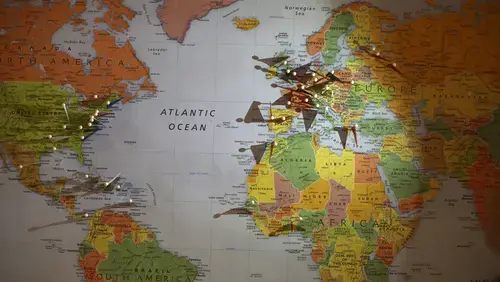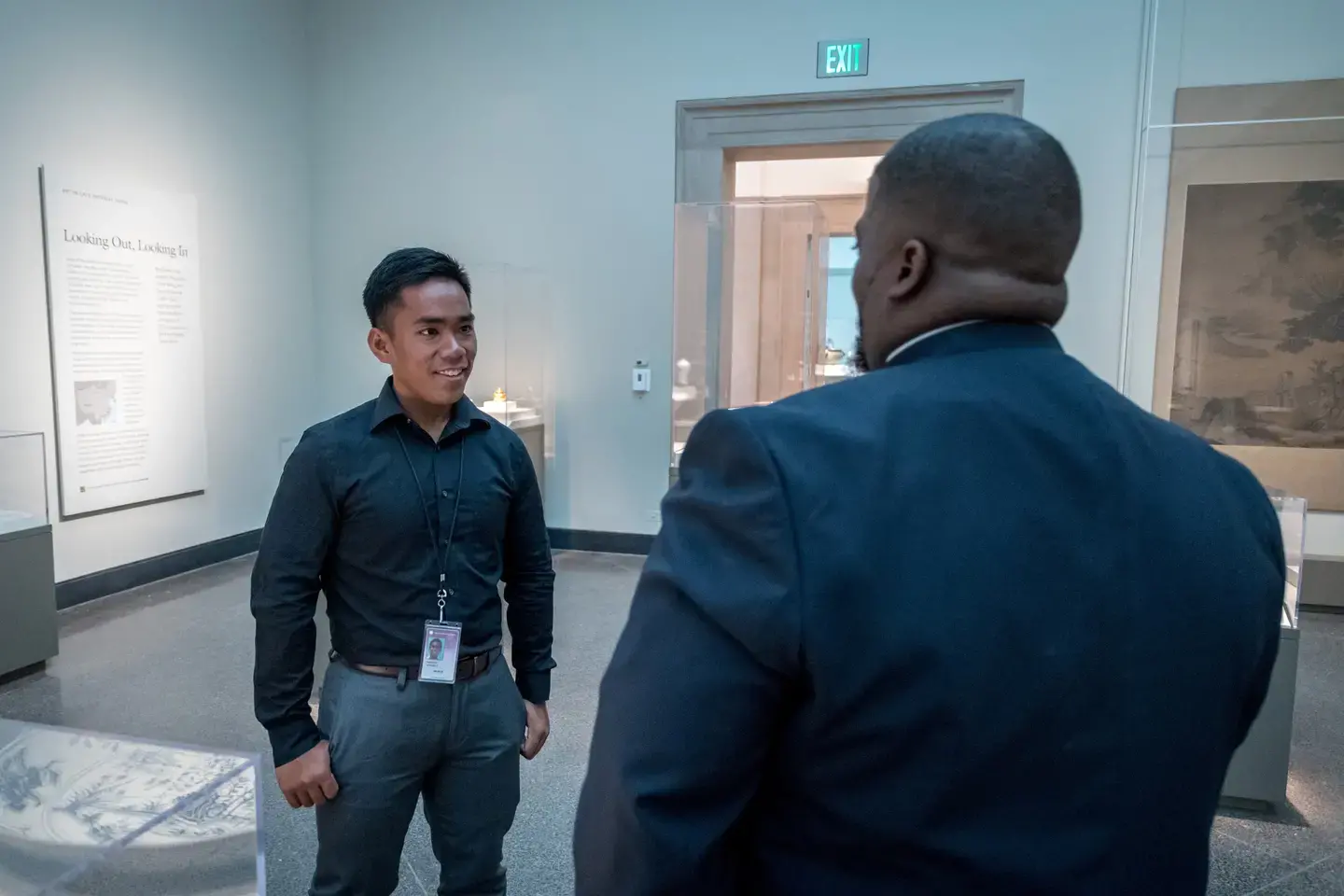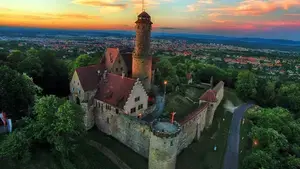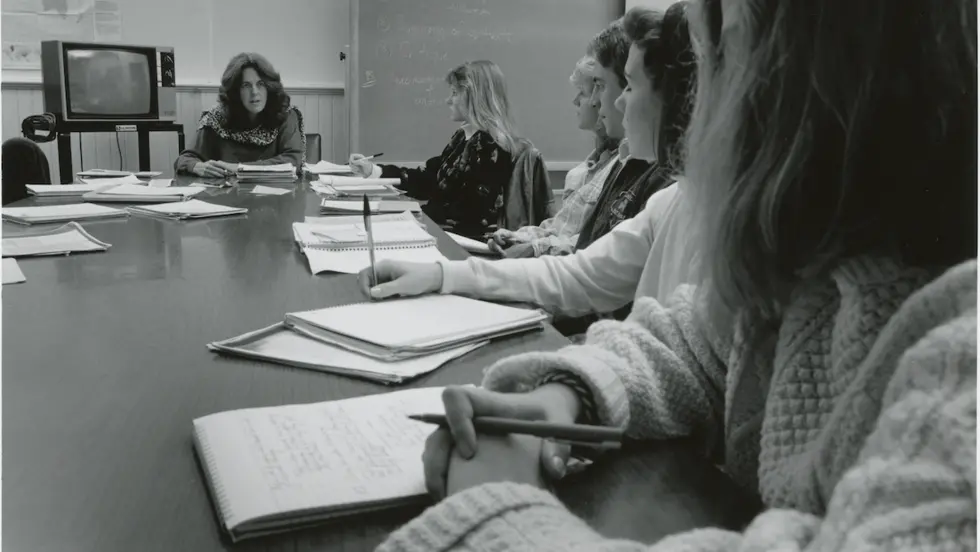
History

Areas of Study
Students enrolled in history at Holy Cross explore their major and gain depth in a particular aspect of history through a global concentration. Spanning geographic locations and time, students select coursework based on areas of interest.
- Colonialism and Empire
- Gender in Public and Private Life
- Race and Ethnicity
- Resistance, Revolution and Reaction
- Knowledge and Belief
- War and Memory
Requirements
Majors must take a minimum of 10 courses and may take a maximum of 14 courses. Advanced Placement credits do not count toward that total.
First-year students interested in majoring in history are encouraged to take Montserrat courses taught by members of the department. A sequence of two such Montserrat courses counts as one course toward the history major. First-year students are also encouraged to enroll in 100-level history courses. Students should take at least one college-level history course prior to enrolling in HIST 200, The Historian’s Craft, which is ordinarily taken in the second year.
At least five courses for the major must be numbered 201 or higher, including two courses numbered 300 or higher. All majors are required to take The Historian’s Craft (HIST 200.) This course is normally taken in the sophomore year, after the student has completed at least one college-level history course; no seniors will be admitted to it. Historian’s Craft is a prerequisite for all advanced courses at the 300 or 400 level. Non-majors without Historian’s Craft must receive permission from the instructor to enroll in advanced courses.
All majors must take at least two Pre-Modern/Pre-Industrial courses.
Fourth-year majors will not be admitted to 100-level courses, except with special permission from the department chair.
All majors must select one of the following six themes as a field of concentration within the major:
- Colonialism and Empire
- From the Roman to the Aztec, from the Mughal to the French, empire is one of the most enduring and oldest forms of political organization, and its story has never been simply one of conquest and resistance. Beyond its political manifestations, imperial relations have included and produced far-reaching networks of trade, religion, education and culture. The relationships between colonizing and colonized peoples have been highly complex and have involved violence, collaboration, defiance and negotiation, often at the same time. Scholars debate not only the nature of these interactions, but also their enduring implications. How have people established, maintained and contested imperial power? How have colonizing forces justified empire, and how do we evaluate its impact? Is the age of imperialism over or does it persist in new forms?
- Gender in Public and Private Life
- Gender, as an expression of power relations and identity, lies at the root of human experience and historical inquiry. More than a synonym for women’s history, gender situates women as well as men, through ideas about manhood and womanhood, at the center of historical analysis. A gendered approach to the study of history asks questions about the ways human perceptions of sexual difference – of masculinity and femininity and the norms of behavior deemed appropriate for men and women – have shaped major forces and events in the past. Are gender identities fixed and biologically determined? Or are they constructed by societies to express the political, economic and social anxieties and values of a given time period? Is gender’s impact limited to domestic spaces, such as family organization, or is it present in larger public arenas, such as war, policy-making, law and diplomacy? Taking a gendered analysis into account can broaden what we deem as “history,” can highlight previously marginalized voices and can challenge the assumptions and periodization of standard historical narratives.
- Race and Ethnicity
- Many people think of race as natural and self-evident; as old as humanity itself and as simple as black and white. However, human societies across time and geography have created ways of making and experiencing “difference” according to invented categories of ethnicity and race. These divisions have formed the rationale for oppressive hierarchies within societies as well as for liberation movements. What causes race to come into existence as a way of understanding the world? How has race operated in different regions of the world—for example, within and between the Americas, Asia, Africa and Europe? What are the origins of racial-ethnic thinking, and how have racial and ethnic categories informed socio-political relations over time? How have people created and experienced social differences? How have individuals or groups developed strategies both to perpetuate and to change racial and ethnic dynamics?
- Knowledge and Belief
- The ways in which individuals and societies come to know the world and create meaning have changed dramatically across different times and places in history. Courses in this concentration investigate how religion, science, philosophy, art and law affect human actions and beliefs. Going beyond the study of formally articulated ideas, these courses examine how individuals and societies create, contest and transmit different systems of meaning and value. Students learn to analyze fundamental issues within the histories of religion, science, technology, popular culture, law, political ideology and cultural transfer.
- Resistance, Revolution and Reaction
- Political upheavals occur when a group of individuals rejects the dominant values of the status quo and struggles to create a different social order. These upheavals can range from bottom-up mass movements to top-down military coups. In such struggles for power, insurgents endeavor to win support for a new set of norms, which can range from promoting civil rights to advocating genocide. Moreover, while some revolutions produce paradigm-shifting gains in democracy and social welfare, others conducted in the name of liberation have generated more of the very exploitation they first pledged to eliminate. How did people understand such transformations at the time and how did succeeding generations re-assess and re-imagine them? What prompts people to decide to break the rules of their community or risk their lives for social change? How is power won, and how is it maintained and institutionalized? How do societies, both ancient and modern, decide who should have rights and who should be denied them? What roles have civil disobedience, violent resistance and even terror played in both the challenging of order and the crushing of dissent?
- War and Memory
- Wars do not begin and end on the battlefield. They originate within particular historical contexts, in response to factors ranging from the political and strategic to the social and cultural. Moreover, long after the final battle has been fought, the memory of warfare continues to be shaped, debated and changed, affected not least by whether one was on the winning or losing side. Memories of war can often be contentious, producing bitter conflicts about national holidays, museum exhibits, reenactments, school textbooks, literature and films. What causes wars? How have contemporaries justified war? What effects have wars had on political development, gender relations, the economy and society? What unintended consequences have resulted from war? Has there always been a clear winner and loser?
With the assistance of a faculty advisor in the department, each student submits a rationale and a course plan during the fall semester of the junior year. The course plan must include four courses that can be clustered within the chosen theme. One of these four courses may be at the 100 level; one of these four must be at the 300 or 400 level. The theme must incorporate more than one geographic area. The Historian’s Craft course cannot be included in one’s Global Themes.
All majors must complete a Capstone Project. This project must be completed during the senior year, in the student’s Global Themes, within a 300- or 400- level course. The Capstone Project is a summative research project of significant length. The specific nature of the Capstone Project is at the discretion of the instructor of the course.
Transfer students and students who study away may receive credit toward the major for up to four history courses if they are away for a year or up to two history courses if they are away for a semester. Courses taken elsewhere must be approved by the history department for credit toward the major.
- American Slavery, American Freedom
- World War II in East Asia
- Hist of Capitalism: US & World
- Irish American Experience
- British Soc & Empire 1763-1901
- Eur:Mass Polit/Tot War 1890-1945
- Nature, Culture, and Power in Global History, 1500-1850
- Wicked Women and Proud Patriarchs: Gender & Sexuality in Colonial Latin America
- U.S. Mexican Border
- Afro-Latin America
- Collapse of Communism
- Resistance & Rev in Mod Africa
Meet Your Department Chair

Opportunities
Beyond the Classroom
Beyond traditional classroom work, students have opportunities to collaborate on research with faculty, complete internships in Washington and elsewhere, participate in a semester long American Antiquarian Society undergraduate research course, conduct yearlong senior theses and engage in community based learning opportunities.
Study Abroad
Students are encouraged to partake in study abroad immersion programs, integrating their studies and experiences abroad.
"History on the Hill"
Interested students may submit their essays for publication to the history newsletter, "History on the Hill," a yearly publication produced by Holy Cross history majors with the help of faculty advisors.
National Honor Society
Phi Alpha Theta is a professional honor society whose purpose is the promotion of the study of history through the encouragement of research, good teaching, publication and the exchange of learning and ideas among students and faculty of history.
Outcomes
Students are trained to think systemically, to analyze and interpret multiple viewpoints and perspectives, to speak and write with clarity and originality and to respect the canons of good scholarship. Recent graduates have gone on to work in television and film production, business, government and politics, law, higher education, teaching, museum curations, non-profit organizations and health professions.







